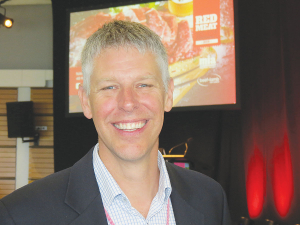All sizzle, no sausage — Editorial
OPINION: Despite all the hype and political theatre surrounding last week’s release of the Primary Sector Council’s report, the document seems more like a horoscope than a clear guide to anywhere.
 Lain Jager says the report is designed to inform policy makers on the path of travel NZ's primary sector needs to take in the future.
Lain Jager says the report is designed to inform policy makers on the path of travel NZ's primary sector needs to take in the future.
A primary sector think tank believes it's incredibly important for the NZ sector to grow exponentially and a big focus should be on developing exports in the 'wellness' space.
Lain Jager head Te Puna Whakaaronui - an offshoot of the Primary Sector Council - which has just produced a 48 page report. Jager claims the report is designed to inform policy makers on the path of travel NZ's primary sector needs to take in the future.
Jager says it's not unreasonable for the primary sector exports to grow by 2% annually, with the aim of reaching $85 billion by 2050. He says this is necessary because our economy faces higher superannuation and health costs - caused by an aging population along with the cost of de-carbonising the economy and dealing with ongoing labour shortages.
"The report looks at how we can retain our current food and fibre sector - that means dairy, sheep and beef, horticulture, wine, forestry and fishing - and how can we continue to grow these," Jager told Rural News. "The report also looks at new growth opportunities and how we can unlock these."
One issue the report highlights is the 'wellness' niche and it says the global pandemic has seen increased consumer focus on healthy food and nutrition. It says a tightening of our focus on wellbeing enables NZ to "leverage the best of our Food and Fibre Sector, as well as fairly the value of our rich Māori heritage and our reputation for providing quality food".
The report claims the wellness economy is one of the largest and fastest growing global consumer segments. It says, in the past, NZ companies have tried to access segments of this market but have made slow progress. The report quotes McKinsey as predicting that over the next decade 80% of consumption growth in Asia will come from the top two income tiers. It says this aligns with NZ's aspirations to claim market position in high value health and nutrition market segments.
According to Jager, while the global economy is looking pretty ropy at the moment, the future is bright for the NZ primary sector - if it can capitalise on its strengths and ensure this is matched by quality science and innovation.
"I would argue that this report and reports like this are as relevant as they have ever been," Jager claims. "The reason is that climate change is sitting across everything and - as a consequence of that - is the unparalleled rate of technological change globally in food value chains."
He claims this is leading to the evolution of consumer preferences, at both the commodity and high value end, and the geopolitical tensions driving interest in food security and shortening supply chains.
Jager says the good news is that there are clearly growth opportunities for the NZ food and fibre sector.
Budou are being picked now in Bridge Pā, the most intense and exciting time of the year for the Greencollar team – and the harvest of the finest eating grapes is weeks earlier than expected.
The Real Estate Institute of New Zealand (REINZ) has released its latest rural property report, providing a detailed view of New Zealand’s rural real estate market for the 12 months ending December 2025.
Rural retailer Farmlands has released it's latest round of half-year results, labeling it as evidence that its five-year strategy is delivering on financial performance and better value for members.
OPINION: "We are back to where we were a year ago," according to a leading banking analyst in the UK, referring to US president Donald Trump's latest imposition of a global 10% tariff on all exports into the US.
DairyNZ says the Government’s proposed Resource Management Act reform needs further work to ensure it delivers on its intent.
Overseas Trade Minister Todd McClay says he's working constructively with the Labour Party in the hope they will endorse the free trade agreement (FTA) with India when the agreement comes before Parliament for ratification.

OPINION: A mate of yours truly reckons rural Manawatu families are the latest to suffer under what he calls the…
OPINION: If old Winston Peters thinks building trade relations with new nations, such as India, isn't a necessary investment in…